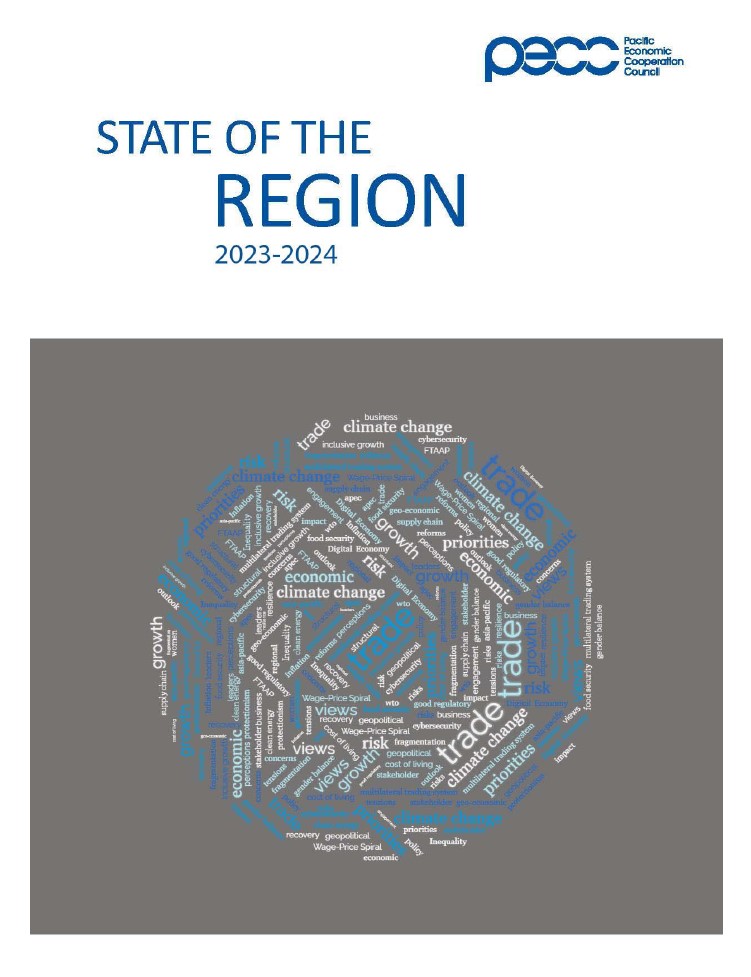 EXECUTIVE SUMMARY
EXECUTIVE SUMMARY
From March to April 2023 the Pacific Economic Cooperation Council (PECC) conducted its annual survey of regional policy experts’ views on the State of the Region. Out of the more than 700 respondents, 47 percent expected worse growth for the global economy, a slight improvement over the 60 percent in last year’s survey. At the same time, they were slightly less pessimistic about the prospects for their own economies with 33 percent expecting weaker growth. The continued perception of weaker growth is likely to weigh heavily on business and consumer sentiment, especially with high inflation rates reducing space for discretionary expenditure.
Inflation was still considered the highest risk to growth by respondents with 52 percent of respondents selecting Rising cost of living as a top 5 risk to growth for their economy, almost the same share as last year’s 51 percent who selected inflation. The increasing cost of living stood out as a risk, with 43 percent selecting climate change. Although fewer respondents selected geo-economic fragmentation as a risk, those who did considered the impact of the world dividing into blocs as posing a slightly higher risk for their economies. The top 5 risks were: rising cost of living; geo-economic fragmentation; climate change; slowdown in world trade growth; and increased protectionism and trade wars.
There was considerable alignment between what our respondents considered to be major risks to growth and issues they thought APEC Leaders’ should address at their upcoming meeting in November apart from inflation. They were:
- Ameliorating geopolitical and trade conflicts in the region
- Strengthening Supply Chain Resilience
- Structural reforms, good regulatory practices, standards alignment, and anti-corruption efforts
- Updating the region’s ambitions on climate and clean energy
- Support for the multilateral trading system and the WTO
This was especially true for views on climate change and the need for further action by the region, as well as perceptions of slower trade growth and increased protectionism and the need to reduce geopolitical tensions and trade conflicts.
These survey findings also support the focus of APEC this year which is “Creating a Resilient and Sustainable Future for All”, with priorities focused on:
- Building a resilient and interconnected region that advances broad-based economic prosperity.
- Enabling an innovative environment for a sustainable future; and
- Affirming an equitable and inclusive future for all.
Underpinning these priorities is a strong desire to broaden and deepen stakeholder engagement. While above 50 percent of respondents thought that government regular consultation with businesses and legislators was ‘just right’, around a quarter or less of respondents thought that other stakeholders ranging from academics and research institutions through to civil society and organized labor was sufficient. The need for greater stakeholder consultation was emphasized by APEC Leaders in the 2021 Aotearoa Plan of Action. While PECC’s survey results show a great deal of shared perceptions by regional stakeholders, it also identifies areas where greater regional consultation and dialogue is needed. Moreover, the lack of ‘balance’ in engagements may well result in the pursuit of a very different policy agenda than if there was more equality of ‘voice’ representation at all levels.
(Click here for the full report)

 EXECUTIVE SUMMARY
EXECUTIVE SUMMARY